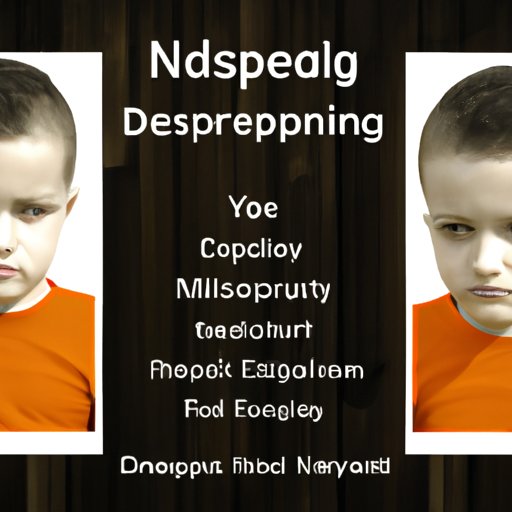Introduction
Narcissistic Personality Disorder (NPD) is a mental health condition characterized by an excessive preoccupation with self-image and one’s own success. People with NPD have an inflated sense of their own importance and are often highly sensitive to criticism or defeat. They feel entitled to special treatment and may be exploitative or manipulative in their relationships.
In this article, we will explore the various factors that contribute to the development of NPD. We will examine the impact of early childhood experiences, trauma, social media, and cultural factors on the development of this disorder. By understanding these influences, we can gain insight into how narcissistic traits form and persist.

Examining the Impact of Early Childhood Experiences on Narcissistic Personality Disorder
Early childhood experiences can have a significant impact on the development of NPD. In particular, genetics, parenting styles, and exposure to social media can all play a role in shaping a person’s narcissistic tendencies.
The Role of Genetics
Research suggests that certain genetic factors may be associated with an increased risk for developing NPD. For instance, studies have found that people with a family history of narcissism are more likely to display narcissistic traits themselves. It is important to note, however, that genetics do not determine whether someone will develop NPD; environmental factors also play a key role.
Parenting Styles and NPD
The way a person is parented during childhood can also affect the development of narcissistic traits. Studies have shown that overindulgent parenting, which involves giving too much attention and praise, can lead to an increased risk of developing NPD. This type of parenting may lead to a child feeling overly entitled and having an exaggerated sense of self-importance.
The Effects of Social Media
Social media platforms such as Instagram, Facebook, and Twitter can also play a role in the development of narcissism. These platforms provide an environment where users can compare themselves to others and receive instant feedback about their appearance, accomplishments, and lifestyle. This can lead to feelings of envy and insecurity, which can fuel narcissistic tendencies.
Exploring the Relationship Between Trauma and Narcissism
Trauma can also be a contributing factor in the development of narcissistic traits. Research has found that people who have experienced traumatic events in their childhood, such as physical or sexual abuse, are more likely to develop narcissistic tendencies. This is because trauma can lead to feelings of insecurity, low self-esteem, and an inability to trust others.
The Connection Between Trauma and NPD
The link between trauma and NPD is complex and multi-faceted. In some cases, trauma can lead to an increase in narcissistic traits as a coping mechanism. People who have experienced trauma may use narcissistic behaviors as a defense against feelings of vulnerability or pain. In other cases, trauma can lead to a decrease in narcissistic traits, as people attempt to rebuild their sense of self-worth and identity.
Uncovering the Link Between Narcissism and Trauma
It is important to understand the connection between trauma and narcissism in order to effectively treat NPD. Therapists must be aware of their clients’ past traumas in order to provide appropriate treatment. For example, therapy may need to focus on building self-esteem, establishing healthy boundaries, and learning to trust others in order to reduce narcissistic tendencies.

Investigating the Influence of Cultural Factors on Narcissistic Personality Development
Cultural factors can also play a role in the development of narcissistic traits. In particular, peer pressure and societal expectations can shape a person’s perception of themselves and their worth.
Assessing the Role of Peer Pressure
Peer pressure can lead to a distorted view of self-worth and an increased desire for approval. People may feel pressure to conform to the expectations of their peers, which can lead to an increased focus on image and status. As a result, they may become more focused on their appearance and achievements, leading to narcissistic traits.
Understanding the Influence of Cultural Factors
Cultural norms can also shape a person’s behavior and attitudes. For instance, in some cultures, there is an emphasis on individualism and achievement, which can lead to an increased focus on self-image and success. In contrast, in other cultures, there is an emphasis on community and cooperation, which can lead to a more balanced view of self-worth.
Conclusion
To conclude, there are numerous factors that can contribute to the development of Narcissistic Personality Disorder. Early childhood experiences, trauma, social media, and cultural factors can all play a role in shaping a person’s narcissistic tendencies. By understanding these influences, we can gain insight into how narcissistic traits form and persist.
It is important to note that NPD is a complex disorder and that each case is unique. There is no single cause for NPD, and it is important to take into account the various factors that can contribute to its development when seeking treatment.
Summary of Findings
This article explored the various factors that can contribute to the development of Narcissistic Personality Disorder. Early childhood experiences, trauma, social media, and cultural factors were all identified as potential influences on the development of narcissistic traits. It was emphasized that NPD is a complex disorder and that each case is unique.
Implications for Future Research
Further research is needed to better understand the causes of NPD and to develop effective treatments. It is also important to explore how different cultural contexts may shape the development of narcissistic traits. Finally, research should focus on developing interventions to help people with NPD manage their symptoms and lead healthier lives.
(Note: Is this article not meeting your expectations? Do you have knowledge or insights to share? Unlock new opportunities and expand your reach by joining our authors team. Click Registration to join us and share your expertise with our readers.)
